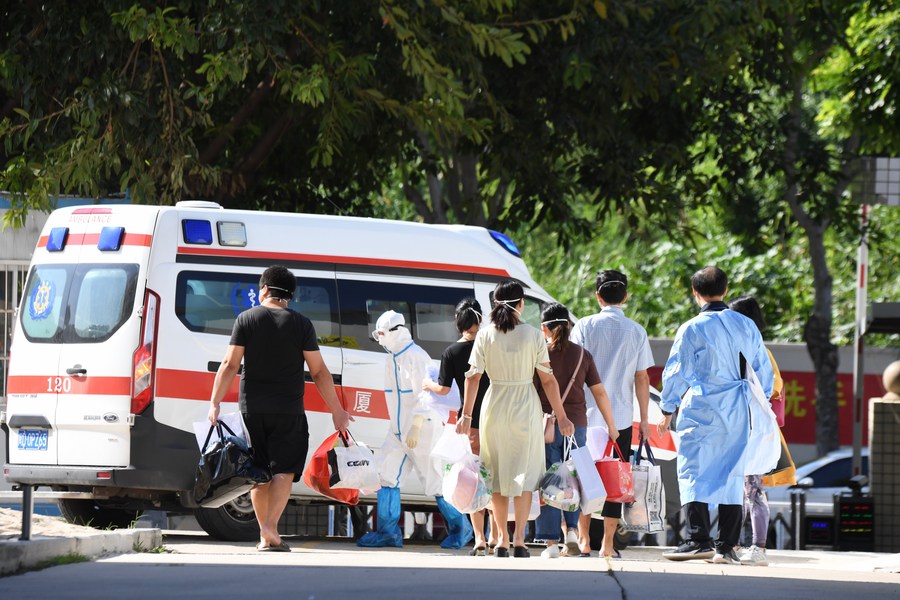Looking for COVID-19 wonder drug

Patients recovered from COVID-19 prepare to get on an ambulance to a medical facility for rehabilitation in Xiamen, east China's Fujian Province, on Sept. 25, 2021. Seven COVID-19 patients were discharged from hospital in the city of Xiamen, east China's Fujian Province, on Saturday after recovery. (Xinhua/Jiang Kehong)
BEIJING, Sept. 26 (Xinhua) -- Since the outbreak of the pandemic, scientists worldwide have been looking for drugs to treat COVID-19 successfully. As variants of the virus have emerged to challenge the vaccines' effects, Chinese drug researchers and developers try to find the right medicine to beat the virus.
Chinese researchers and pharma companies are hunting for the right one in two ways: biological macromolecular drugs based on antibodies and small molecular compounds that can inhibit virus invasion and replication.
Rapid advancements have been made in biological macromolecular drugs, most of which are antibodies, including monoclonal antibodies and antibody cocktail therapy. Some countries have approved antibody drugs for marketing and emergency use. They are used in the early stage of COVID-19 to lower the risks of developing into severe cases.
Monoclonal antibodies enlist human-made proteins that act like human antibodies in the immune system to fight off harmful pathogens such as viruses. They may also be used in combination with other treatments to form a cocktail.
The antibody drugs bind to the virus, blocking the access to human cells and inhibiting the infection and replication inside human cells, said Zhu Qing, senior vice president of Brii Biosciences and head of the company's biopharmaceutical department.
Earlier this month, the China National Biotec Group affiliated with Sinopharm unveiled Human COVID-19 Immunoglobulin (pH4) for Intravenous Injection, which was approved for clinical trials.
In August, Sinopharm also announced that its research team had discovered a potent neutralizing antibody against the Delta variant that could be effective in the short-term prevention and early treatment of COVID-19 triggered by the variant.
The monoclonal antibody, called 2B11, can effectively block the binding of novel coronavirus to the ACE2 enzyme attached to the membrane of cells in the intestines, kidney, testis, gallbladder and heart, preventing the virus from infecting cells.
In July, Tsinghua University, the Third People's Hospital of Shenzhen and Brii Biosciences launched phase II clinical trials in China on a cocktail therapy of monoclonal antibodies BRII-196 and BRII-198. They were derived from antibodies isolated from people who had recovered from COVID-19.
The cocktail therapy also entered clinical trials in the United States, Argentina, South Africa, Brazil, the Philippines, and Mexico. The data suggested that BRII-196/BRII-198 could be a potent new treatment option for COVID-19.
Compared with biological macromolecular drugs, small molecular compounds have various mechanisms to play their roles by inhibiting the invasion, replication, assembly, and release of viruses.
DC402234 (FB2001), a COVID-19 drug candidate mainly developed by a research team at the Shanghai Institute of Materia Medica of the Chinese Academy of Sciences, entered Phase I clinical trial in the United States in March. It is a compound designed and synthesized through analyzing the crystal structure of the coronavirus' membrane protein.
DC402234 became the cover story of the journal Science in June.
Ding Sheng, dean of School of Pharmaceutical Sciences at Tsinghua University, told Xinhua that it is hard to apply antibody drugs in early prevention. The antibody drugs, which need to be injected, are inconvenient to use among mild cases and non-hospitalized patients. They are also more costly, cannot adapt to the mutant variants well, and need cold-chain transportation.
Compared to their bigger counterparts, small molecular drugs have advantages in a large-scale promotion. They can be taken orally and stored at room temperatures.
Ding noted that small-molecule drugs could be quickly used in high-risk groups such as close contacts, or help patients with mild symptoms to improve their condition.
However, it takes a relatively long time to verify the drug's toxicity, making the R&D of small molecular drugs much slower.
Experts have pointed out that vaccines and drugs are both pivotal in controlling the spread of the virus. According to the current situation, researchers should focus on developing drugs for effective early prevention, drugs that can reduce mortality, and broad-spectrum antiviral drugs that can deal with mutant strains in the future.
Photos
Related Stories
- 3 temporary labs for nucleic acid testing built in Bayan County, Heilongjiang
- Zimbabwe receives more China-donated vaccines against COVID-19
- Over 2.19 bln COVID-19 vaccine doses administered in China
- China's Harbin adds 1 high-risk COVID-19 area
- Chinese mainland reports 9 new locally transmitted COVID-19 cases
Copyright © 2021 People's Daily Online. All Rights Reserved.










